“Nobody can go back and start a new beginning, but anyone can start today and make a new ending.”
-- Maria Robinson
-- Maria Robinson
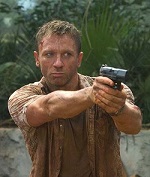 Craig as Bond
Craig as Bond Casino Royale was one of the movies MGM hoped would pull them out of their slump (they still went bankrupt several years later). It represented a reinvigoration of the Bond franchise, getting back to basics by using a novel the producer's hadn't had the rights to until a lawsuit returned all James Bond licenses to the Broccoli family (no more Thunderball remakes! Yay!). As they were rebooting, they showed Pierce Brosnan the door and made the interesting casting choice of Daniel Craig, a man British papers heralded as "James Bland". The producers, however, must have seen something the rest of us didn't, because Craig kills it. He approached it as not trying to fill anyone's shoes (there'll never be another Connery), but just trying to be the Bond the director and producers wanted him to be. Though public opinion is somewhat split on the issue, I for one like the human element brought to Bond in this movie, and think it's the best one to date (Skyfall was an amazing action movie, but a terrible Bond movie).
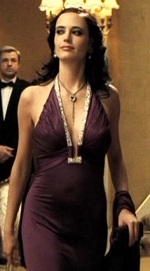 Green as Lynd
Green as Lynd When I said getting back to basics, I meant it. Sure, there are three "Bond girls" in Casino Royale, but Bond is really only invested in one: Vesper Lynd. Though the franchise tried the brainy love interest before (the less said about Denise Richards as a nuclear scientist, the better), they'd never tried one quite like Vesper. She has Bond sized up (including literally) almost from the minute they meet. The equal of Bond in the romantic arena, she's the most fully-formed female character in a Bond movie yet (even surpassing M, whose maternal care for Bond is about her only dimension). She provides a way for the movie to give all the details it wants to about Bond's backstory in a very controlled manner that leaves you wanting more (the sort of restraint Skyfall could've learned from) through their adversarial repartee when they first meet. What she becomes is the sort of love interest that harkens back to On Her Majesty's Secret Service (not a good movie, but not worth the venom regularly spewed its way) in a way Bond purists hate, but fans like myself love. James Bond works better with depth and emotion behind the detachment and Casino Royale goes a long way towards explaining how he developed. Even when treating the Bond franchise as one coherent timeline, which is almost impossible, this sort of character development only adds to the enjoyment.
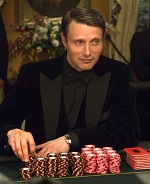 Mikkelsen as Le Chiffre
Mikkelsen as Le Chiffre The movie takes expert advantage of the inherent benefits that a Bond movie has that arguably no other franchise shares. For example, following Bond's assurance to a woman that they'll just have one drink at his place, we smash cut to the two of them rolling around on the floor of his hotel room. Any other movie would need some sort of Point A to Point B transition, but with Bond, it's almost trivial to show us exactly how that scene developed. As director Martin Campbell had also directed GoldenEye, his experience with a Bond movie probably helped with those sorts of cuts, allowing him to spend more time on the story he wanted to tell. And once it hits its stride, that story mostly revolves around Le Chiffre, played by Mads Mikkelsen whose admittedly limited range is perfect for the part. He is a financier to the world's terrorists, but needs to hastily arrange a high stakes poker game to recoup his losses when he gambles the wrong way on the stock market with some of his clients' funds. This allows an easy public forum for Bond to confront and hopefully take him down in, and the rest of the movie is primarily the cat and mouse at the poker table between the two.
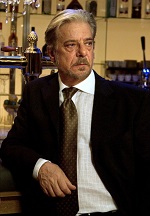 Giannini as Mathis
Giannini as Mathis Forget for the moment the suspension of disbelief required to even get this thing off the ground (why gamble on the stock market when you're so assuredly good at poker and able to set up high stakes games on a whim; or at least, why play the stock market with the money of dangerous, violent men, instead of your own poker winnings?) and what you're left with is a well-paced action-thriller that seems like the outlier of Martin Campbell's catalogue (nothing against The Mask of Zorro or Green Lantern...). Forgive its tiny missteps like the opening sequence being shot in black and white (that adds nothing to the scene and somewhat detracts from the rest of movie seeming to branch out a bit from Bond's established timeline), and it represents a bold new direction for Bond movies that was almost entirely buried with Quantum of Solace. As Skyfall returned much more to the standalone villain of the previous era, this movie will likely be the lone example of an attempt to serialize elements of the Bond franchise. And it's a shame, because it shows what could have been.
A Bond movie that transcends previous limitations of the franchise to become the best example yet.
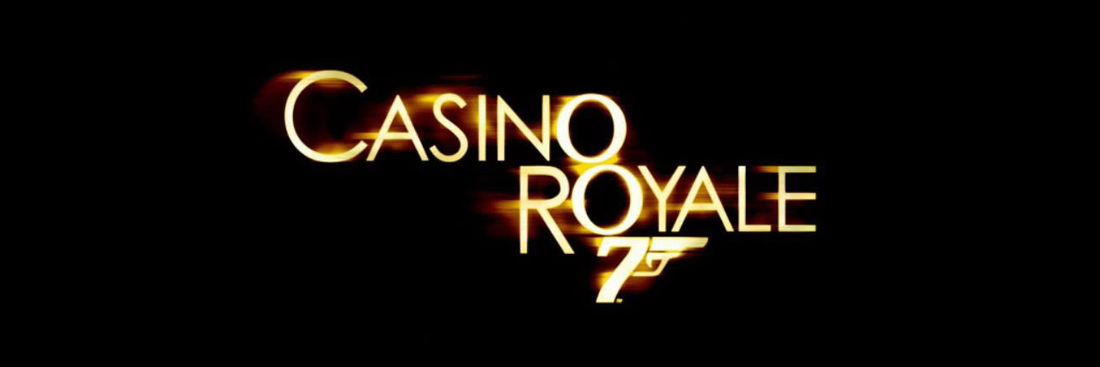


 RSS Feed
RSS Feed